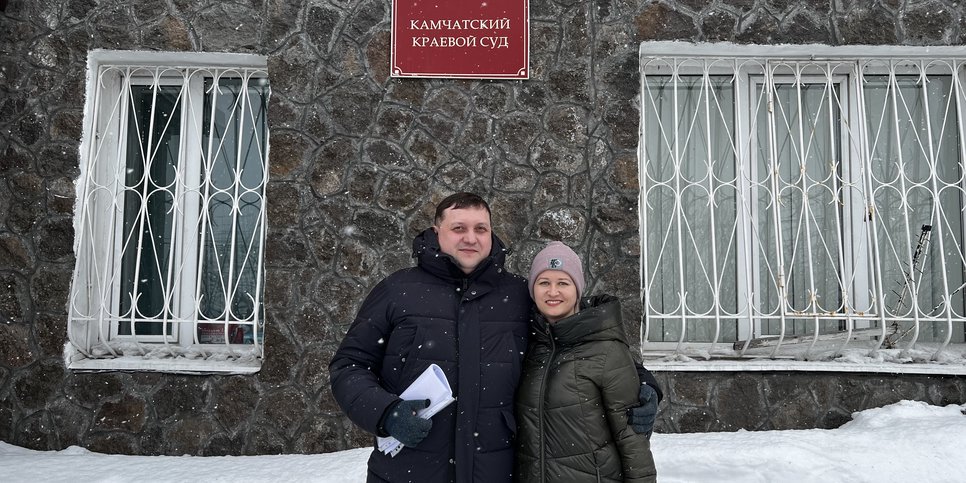Dmitriy Semenov with his wife Nadezhda at the courthouse. February 2023
Dmitriy Semenov with his wife Nadezhda at the courthouse. February 2023
The Appellate Court Upheld the Verdict Against Jehovah's Witnesses From Kamchatka. The Semenovs Were Given a Four-Year Suspended Sentence for Their Faith in God
Kamchatka TerritoryOn February 14, 2023, the Kamchatka Territorial Court considered the appeal of Dmitriy and Nadezhda Semenov against the guilty verdict of a lower court, which gave them a four-year suspended sentence for their faith in God. The appellate court upheld the verdict, and it has entered into force.
The Semenovs learned that they were being criminally prosecuted in September 2021 when a search was conducted in their home. The believers were interrogated and released under a recognizance agreement. Three days earlier, the Investigative Committee initiated a criminal case against the Semenovs under Article 282.2, part 1.1, of of the Criminal Code of the Russian Federation (involving others in the activities of an extremist organization). The charges were based on a letter written by the Semenovs to local resident Yelena Turova that included Bible advice on how to treat others kindly. Afterwards the family experienced regular interrogations and the stress of expecting more searches. Dmitriy explained what helped them cope with anxiety and discouragment: “When we are scared and anxious, prayer helps us find inner peace.”
After 10 months of investigation, the criminal case was submitted to the Petropavlovsk-Kamchatskiy City Court. On November 8, 2022, Judge Vladimir Bykov found the Semenovs guilty of extremism. The prosecutor requested that they be sent to a penal colony for four years, but the court gave them only a suspended sentence.
In the submission to the appellate panel, Dmitriy Semenov drew attention to the complete absence of any evidence of his or his wife’s guilt. The prosecution presented secretly recorded conversations of the believers, but they did not contain even signs of hatred or hostility toward representatives of other religions. No evidence was presented to indicate that the constitutional order of the Russian Federation had been undermined. “There is not a single piece of evidence, only empty, groundless accusations,” said Dmitriy Semenov, adding: “We register our business, we pay taxes ... I respect the state, I am aware of its importance, and I try to follow the laws of our country.”
Nadezhda Semenova also declared her absolute innocence at the appeal hearing and asked the court to use common sense: “Extremists promote violence and incite mass riots. But we did nothing of the kind, and we did not encourage anything like that. I have never been motivated by hatred or enmity. On the contrary, I love people ... I don’t understand what the crime is here and why my husband and I should be sentenced—albeit suspended—for several years."
The judgment of the European Court of Human Rights dated June 7, 2022, declared unreasonable and unjust the prosecution of Jehovah's Witnesses by the Russian authorities on charges of extremism. The ECHR emphasized that the right to "try to convince one's neighbor" is an essential element of religious freedom (§ 168). In addition, the European Court reiterated that the imposition of criminal sanctions for the exercise of religious beliefs is an interference with the right to freedom of religion (§ 264).


